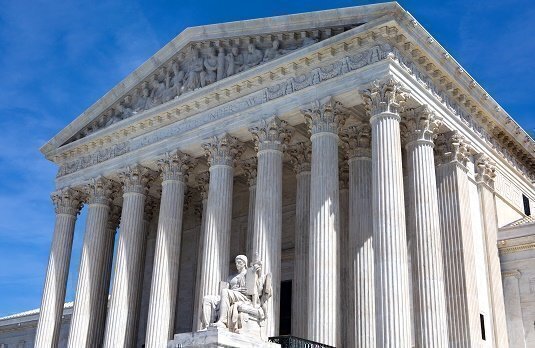Private schools operated by religious organizations gained new hope from the Supreme Court on Tuesday that they could be able to gain access to some forms of government financial support.
 Among a series of orders that the Justices issued at the close of its current term, the court returned four cases to state courts to reconsider bans on such aid, taking into account of the ruling on Monday in a case involving a church-run pre-school in Missouri.
Among a series of orders that the Justices issued at the close of its current term, the court returned four cases to state courts to reconsider bans on such aid, taking into account of the ruling on Monday in a case involving a church-run pre-school in Missouri.
In that new decision, in the case of Trinity Lutheran Church v. Comer, the Justices limited the power of states under their state constitutions to deny all forms of government funding to religious groups. Thirty-seven states have such prohibitions in their constitutions.
The court had been postponing action on four other pending cases until it reached its decision in the Trinity Lutheran case, which involved a form of state financial aid to provide new materials for the surfaces of school playgrounds.
Telling the state Supreme Courts of Colorado and New Mexico to take that decision into account, the court returned three Colorado cases and one from New Mexico. The orders by the Justices do not dictate that the state courts must rule differently than they had before, but they at least must take a new look at the remaining scope of state government power to put up a flat ban on any form of public funding flowing to a religious entity, when the aid was non-religious in nature.
In the Colorado cases, the parochial schools were denied access to a public school district program of providing tuition scholarship money to the parents. In the New Mexico case, parochial schools were not allowed to take part in a program of state-financing learning materials, including textbooks on non-religious subjects.
Once the state supreme courts have reconsidered and issued new decisions on these programs, the loser in those decisions could take the cases back to the Supreme Court to see if the Justices will expand, or cut back on, the impact of the Trinity Lutheran precedent. In that decision, there was a disagreement among the Justices as to just how wide the impact of that ruling would be when tested in the future.
In the final round of orders accepting new cases for review, during the court’s next term that starts in October, the court agreed to return to two kinds of controversies that have been familiar topics over the years.
In one case, the court will be reopening a basic constitutional question – which actually goes as far back as the nation’s founding – on how to divide up the powers of government between the national and state levels. At issue, in a new case from New Jersey, is whether Congress went too far in 1992 in attempting to wipe out state-sponsored gambling on sports events, such as college and professional league games.
A federal appeals court has rejected a challenge by New Jersey state officials to the federal law as it applied to a state law authorizing sports betting at casinos and horse racetracks. The officials’ appeal to the Supreme Court argues that the federal law violates the Tenth Amendment rights of state governments to run their own affairs. The 1992 federal law, they contend, commandeers the state of New Jersey into helping Congress enforce its wishes about sports gambling.
In the other new cases with a theme familiar to the Justices, they agreed to spell out the scope of a 2008 federal law that gives the victims of terrorism sponsored by foreign governments some chances to recover damage awards by seizing assets that a foreign government owns in the United States.
Specifically at issue in this case is an attempt to seize historic artifacts that are supposedly owned by the government of Iran. The individuals who sued are United States nationals who were victims of a 1987 suicide bombing attack in Jerusalem. They successfully sued the Iran government on the theory that it sponsored that attack. They won a damages award of $71.5 million.
In order to collect on that judgment, they sued in a federal trial court in Chicago, seeking Persian artifacts that are held by the University of Chicago and by the Field Museum of National History in Chicago.
Ultimately, they lost their claim in a federal appeals court, which gave a narrow interpretation of the 2008 anti-terrorism law.
Legendary journalist Lyle Denniston is Constitution Daily’s Supreme Court correspondent. Denniston has written for us as a contributor since June 2011 and has covered the Supreme Court since 1958. His work also appears on lyldenlawnews.com.







